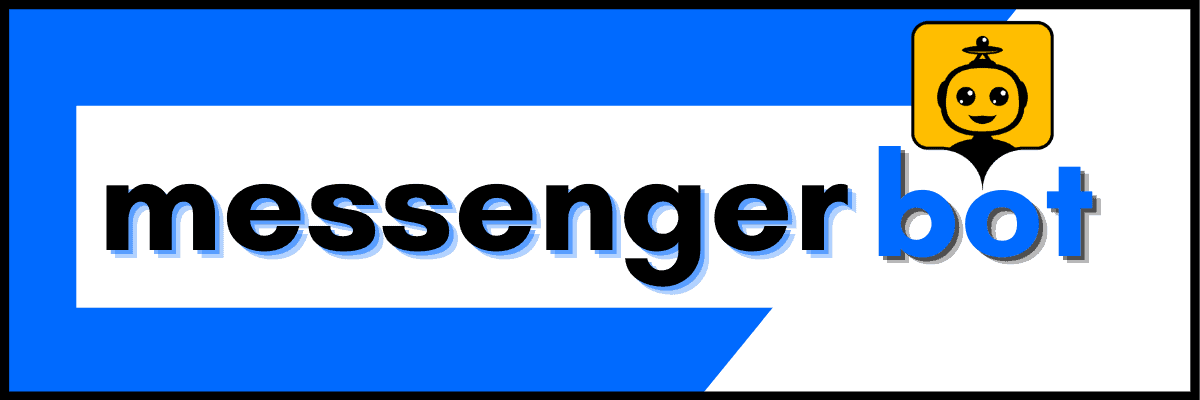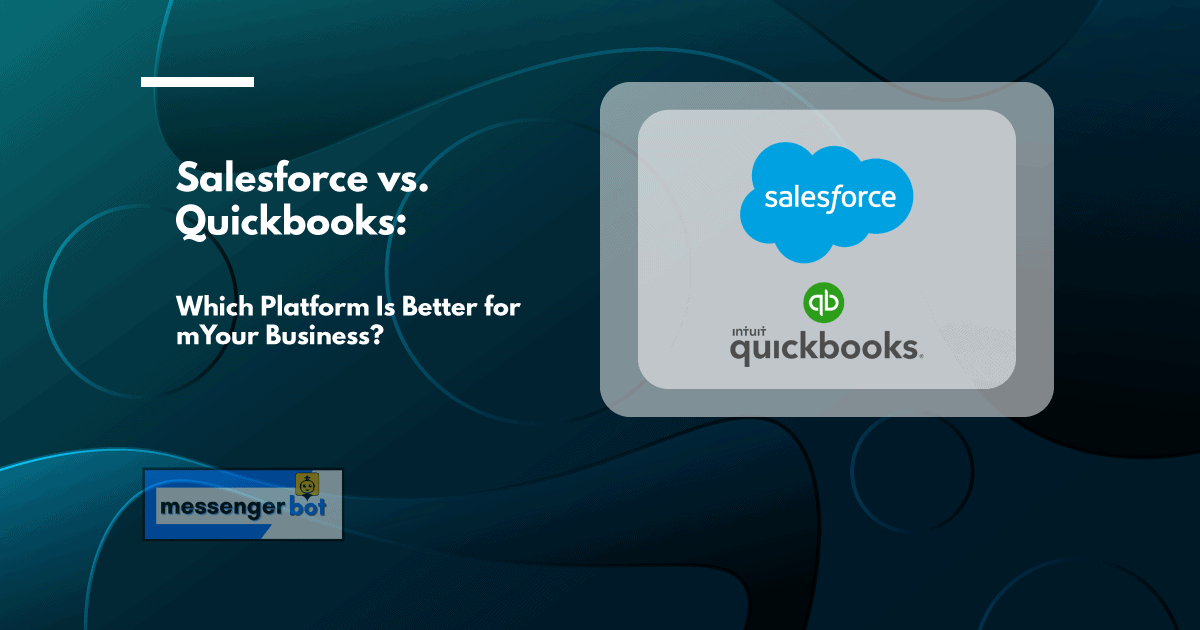There are many accounting and business management software options out there. Two of the most popular ones are Salesforce and QuickBooks. Which one is better for your company? It depends on a few factors, such as what you will be using it for, how many people in your company need access to it, etc. In this blog post, we’ll go over the differences between these two platforms so that you can make an educated decision about which one would work best for your business needs!
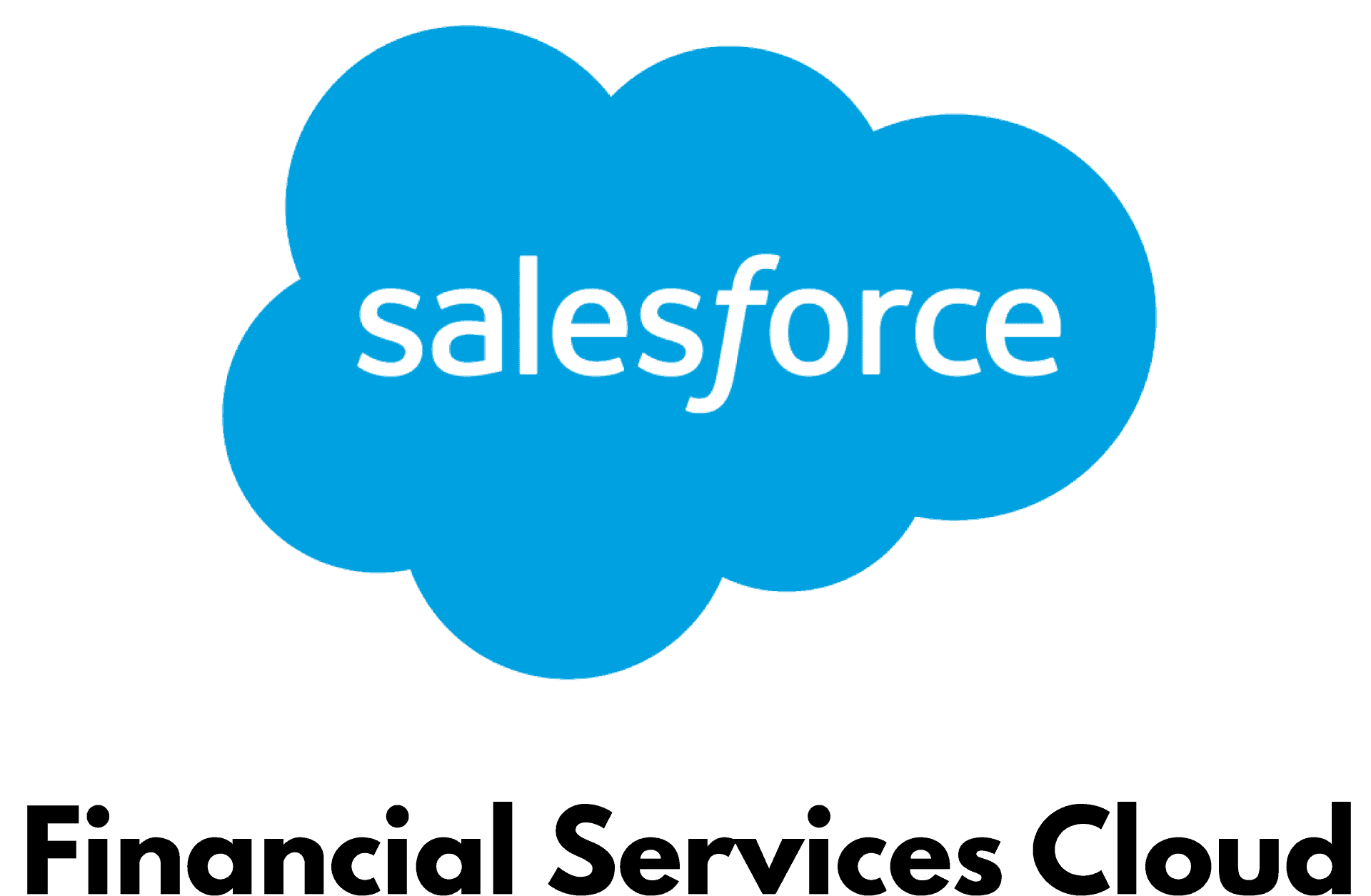
What is Salesforce Financial Services Cloud
Salesforce Financial Services Cloud is a comprehensive, cloud-based solution that offers everything your financial services organization needs to run and grow its business. It delivers an intuitive, consumerized experience across channels, including mobile devices, while providing powerful back-office capabilities for customer service and operations teams.
Salesforce Financial Services Cloud gives you the ability to seamlessly connect with customers through an intuitive, consumerized experience across channels, including mobile devices. They deliver a differentiated customer experience with powerful back-office capabilities for customer service and operations teams. Also, they grow your business with comprehensive functionality for sales, marketing, services, and support.
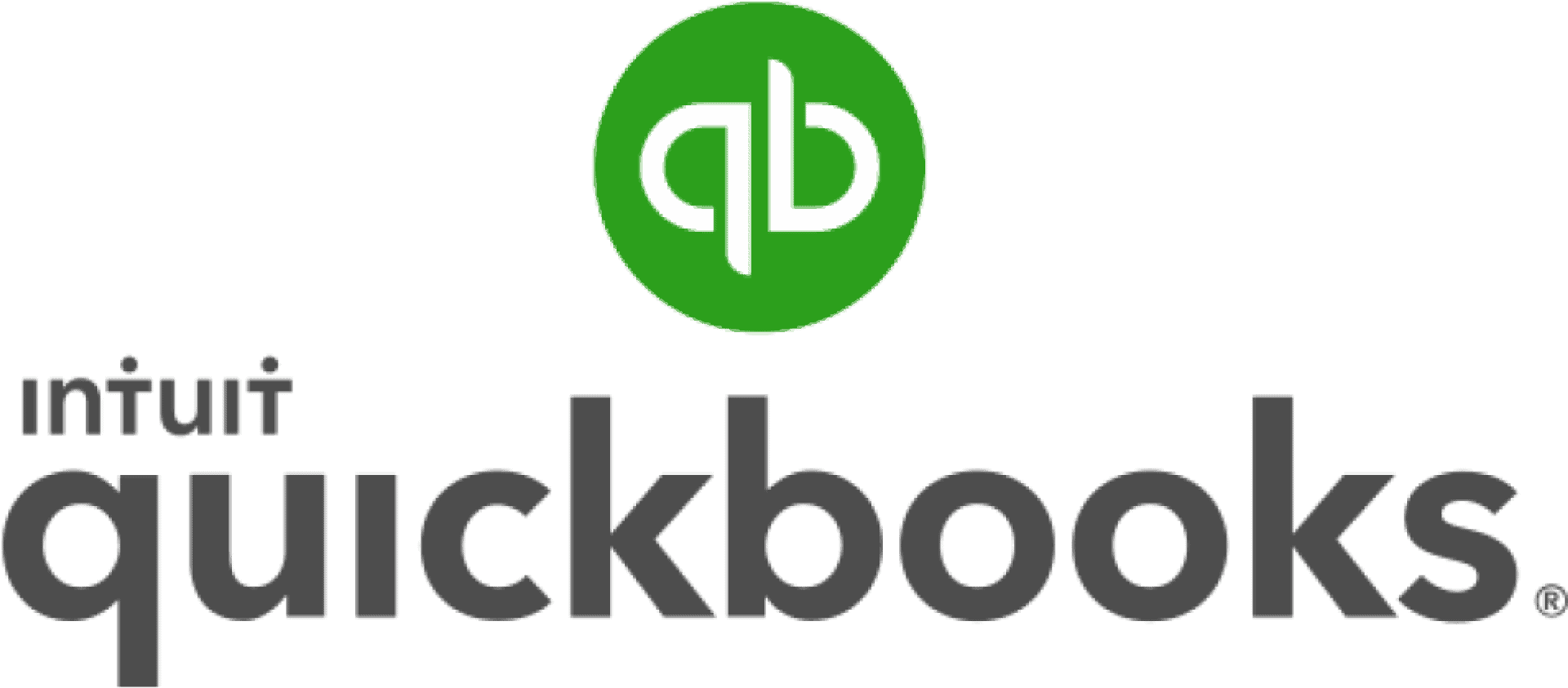
What is QuickBooks?
QuickBooks is a financial software program that helps businesses track their expenses, income, and taxes. It is an affordable solution for small businesses that need to keep track of their finances but don’t have the resources to hire a full-time bookkeeper. QuickBooks makes it easy to create invoices, pay bills, and run reports on your business’s financial data.
QuickBooks is great for businesses that need to keep track of their financial data but don’t want or need all the extra features of more expensive software like Salesforce.
What are the benefits of accounting software?
The benefits of accounting software are many. One of the most important benefits is that it can help you automate your bookkeeping and accounting processes. This can save you time and money, both of which are valuable resources for any business. Additionally, accounting software can help you track your finances more closely and make better business decisions as a result. If you’re looking for a way to improve your business’s bottom line, then investing in accounting software is a good place to start.
Accounting software like Salesforce and QuickBooks can also help you manage your company’s finances in a more efficient way. For example, both platforms enable their users to track invoices and purchase orders. You can even create estimates for potential customers with these products.
What are essential accounting software features?
It’s important to consider the features that are essential for your business when choosing between Salesforce and QuickBooks. For example, if you need invoicing and billing capabilities, then QuickBooks would be a better choice. If you need customer relationship management (CRM) functionality, then Salesforce would be a better choice.
Essential accounting software features vary depending on the business. It’s important to consider your specific needs when making a decision.
Salesforce vs QuickBooks Comparison of Features
Salesforce and QuickBooks are both popular CRMs (customer relationship management) software. They offer a lot of the same features, but there are some key differences between them. This blog post will highlight some of those key differences.

Revenue Management
Revenue management is the process of maximizing a company’s revenue and profits. It is an important part of marketing because it helps to ensure that a company is making the most money possible from its products and services. There are many different aspects of revenue management, including pricing, product mix, and sales channels.
Revenue management is important in marketing because maximizing revenue can help increase profits. It is also one way of ensuring that a company’s products are profitable, which helps to prevent them from losing money on unprofitable items.
Salesforce’s revenue management is based on the idea of price optimization. This means that the company’s software can automatically adjust prices for products and services in order to maximize revenue. Salesforce also offers a variety of other tools to help with revenue management, including its sales forecasting tool, which helps companies predict how much money they will make in the future.
Salesforce’s revenue management tools are very effective at helping companies maximize their profits. This makes it a more helpful platform for marketing than QuickBooks, which does not have any built-in revenue management features.
QuickBooks revenue management is not based on any sort of price optimization or other advanced tools. Instead, it is simply a percentage markup that the company adds to the cost of its products and services in order to calculate their final prices. This makes QuickBooks revenue management less effective than Salesforce’s because companies cannot adjust to changing market conditions using this pricing model.
QuickBooks’ lack of advanced revenue management features makes it a less helpful platform for marketing than Salesforce. This is because companies that use QuickBooks may not be able to make the most money possible from their products and services. As a result, they may be less successful in terms of profits.
In terms of revenue management, Salesforce is a better platform for marketing than QuickBooks. This is because Salesforce offers advanced tools such as price optimization to help companies maximize their profits and ensure that their products are profitable, while QuickBooks only has a simple markup based on percentages.
Salesforce’s revenue management features make it a more helpful tool for marketers than QuickBooks’ lack of advanced revenue management tools. As a result, companies that use Salesforce are more likely to be successful in terms of both profits and maximizing their product value.
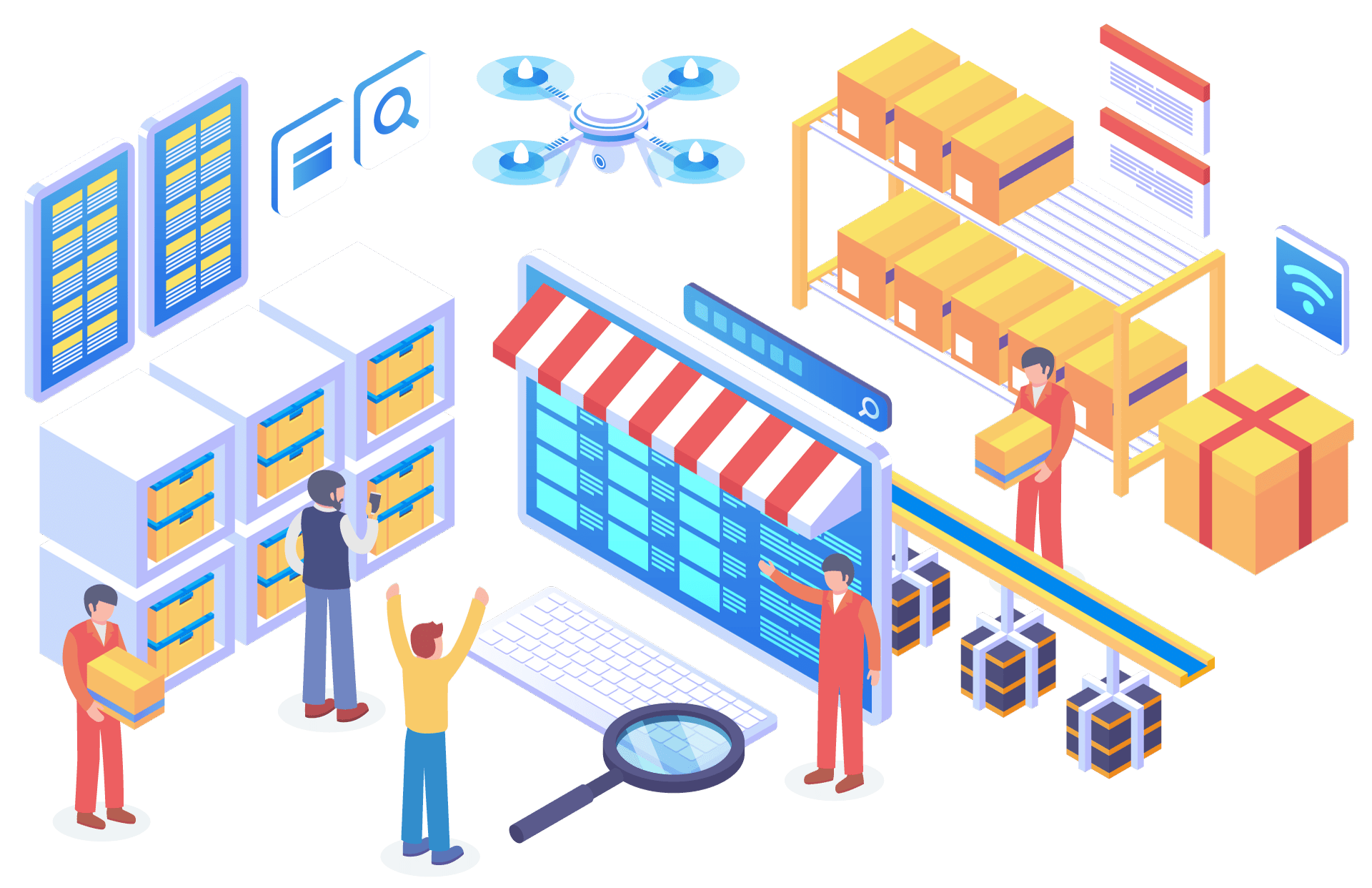
Order & Inventory Management
Order & inventory management is important in marketing because it allows you to keep track of your stock, and place orders for more inventory when necessary. This is especially important for businesses that sell physical products. With Salesforce, you can manage your orders and inventory directly from your dashboard. QuickBooks does not offer this feature, but it does have an add-on called Inventory Management that can help you keep track of your stock.
Order & inventory management is defined as the process of tracking and managing the flow of products in and out of a business. This includes recording what items are sold when they were sold, how many were sold, and where they were shipped to. It also includes tracking inventory levels and placing orders for more inventory when necessary.
Salesforce’s order & inventory management feature is simple to use, but it’s also powerful. You can easily see your inventory levels at a glance on the dashboard so you know when an order needs to be placed for more products. With QuickBooks, managing orders and tracking inventory are separate processes that need to happen in different ways.
Salesforce’s order & inventory management feature makes it easy to keep track of your stock and place orders for more inventory when necessary. QuickBooks does not offer this feature, but it does have an add-on called Inventory Management that can help you keep track of your stock.
Salesforce’s order & inventory management is definitely much better than QuickBooks. With Salesforce, you can easily see your stock levels on the dashboard and place orders from that screen without having to go into a separate product or service page. In fact, even if you’re not using Sales Cloud at all initially, it might be worth investing in just for this feature. QuickBooks does not offer this convenience, instead of requiring you to use an add-on for inventory management.
QuickBooks order & inventory management is not bad, but it takes more effort to set up than Salesforce. Setting up QuickBooks’ inventory management feature requires you to add products individually and keep track of them in your own way. It’s also difficult to see what items are selling well or when they need to be reordered because everything is recorded separately on the dashboard for Accounts Payable, Accounts Receivable, and Inventory.
QuickBooks does not have the convenience of Salesforce’s order & inventory management, which makes it more difficult to keep track of your stock and place orders for more inventory when necessary. However, QuickBooks’ inventory management feature is powerful and can be customized to fit the specific needs of your business.
In terms of order & inventory management, Salesforce is the clear winner. QuickBooks’ inventory management feature is good, but it’s not as simple to use as Salesforce’s. With Salesforce, you can see your stock levels at a glance and place orders for more products directly from the dashboard. QuickBooks does not offer this convenience, instead of requiring you to use an add-on for inventory management. If you’re looking for an easy way to manage your orders and inventory, then Salesforce is the best platform for you.

Procurement
Procurement is the process of acquiring goods and services. It is important in marketing because it can help a company acquire the necessary resources to carry out its marketing plan.
Procurement is an essential part of any business and should be considered when developing a practical marketing strategy that will aid your organization. It impacts all areas of managing the companies’ day-to-day operations, including advertising; distribution; pricing; and sales.
Salesforce’s procurement is based on the following steps. The first step of Salesforce procurement is planning. It includes understanding your business strategy, knowing how much you are prepared to spend and what results you expect from it. You should also look at your competitors’ prices as well as product quality because these factors may influence your choice for the final price level that you set. The second step is contacting suppliers and getting quotes. You can use the internet, various catalogs, or personal visits to contact potential suppliers. It’s important to get as many quotes as possible so you can make an informed decision about who to work with. The third step is analyzing proposals. After you’ve received supplier responses, it’s time to go through them and select the best offer in terms of product quality, price level, and service. The fourth step is negotiations with suppliers. You can negotiate about transportation costs, payment terms or discounts offered to you by your supplier.
The fifth step is contracting a supplier if there isn’t any problem during this stage then you will get a contract signed from both sides. The sixth step is the supplier’s performance evaluation. After you hire a new company to do your procurement for example Salesforce, it will provide you with products and services that meet your expectations in quality and price level so you should check whether the agreement is being followed by both parties. If there are any problems or discrepancies then the chief procurement officer will work with the supplier to correct them.
The seventh and final step is review and renewal. You should regularly review your procurement process, especially when significant changes occur in your business or market conditions. This will help you ensure that you’re getting the best value for your money.
Salesforce is a great choice for businesses that are looking to improve their procurement process. It offers a wide range of features and services that can help you get the most value for your money.
QuickBooks’ procurement is based on the following steps. The first step of QuickBooks procurement is planning. It includes understanding your business strategy, knowing how much you are prepared to spend and what results you expect from it as well as examining competitor prices and product quality because these factors may influence your choice for the final price level that you set.
The second step is contacting suppliers and getting quotes. You can use the internet, various catalogs, or personal visits to contact potential suppliers. It’s important to get as many quotes as possible so you can make an informed decision about who to work with.
The third step is analyzing proposals. After you’ve received supplier responses, it’s time to go through them and select the best offer in terms of product quality, price level, and service.
The fourth step is negotiations with suppliers. You can negotiate about transportation costs, payment terms or discounts offered to you by your supplier.
If there are any problems or discrepancies then the fifth step comes into play: contracting a supplier. If everything goes smoothly then you will get a contract signed from both sides.
The sixth step is the supplier’s performance evaluation. After you hire a new company to do your procurement for example QuickBooks, it will provide you with products and services that meet your expectations in quality and price level so you should check whether or not they are being followed by both parties. If there are any problems or discrepancies then the chief procurement officer will work with the supplier to correct them.
The seventh and final step is review and renewal. You should regularly review your procurement process, especially when significant changes occur in your business or market conditions. This will help you ensure that you’re getting the best value for your money.
QuickBooks is a great choice for businesses that are looking to improve their procurement process. It offers a wide range of features and services that can help you get the most value for your money.
It’s important to note, however, that QuickBooks is not as comprehensive as Salesforce when it comes to procurement. If you’re looking for a more robust solution, then Salesforce may be the better option for you.
In terms of procurement, both Salesforce and QuickBooks offer a wide variety of features that can help you get the most value for your money. If you’re looking to improve your procurement process, then either solution may be right for you depending on what type of business activities are involved in procuring products such as services, goods, or equipment.
QuickBooks is not as comprehensive as Salesforce when it comes to procurement, so if you’re looking for a more robust solution, then Salesforce may be the better option for you. However, QuickBooks is still a great choice for businesses that are looking to improve their procurement process. It offers a wide range of features and services that can help you get the most value for your money.
Salesforce, on the other hand, offers a wide variety of features that can help you with your procurement process. If you’re looking for an all-inclusive solution with access to valuable information about both suppliers and products then Salesforce may be the better option for your business. It’s important to note, however, that QuickBooks is not as comprehensive as Salesforce when it comes to procurement.

ERP Analytics
ERP Analytics is a powerful tool that allows marketers to gain insights into their customers and the end-to-end customer journey. With this information, they can then optimize and tailor digital marketing strategies for maximum return on investment (ROI).
The importance of analytics in marketing is not new as it has been used by successful companies such as Facebook have been using analytics for years. The data gathered from analytics is used to gain insights into customer behavior and how they interact with the company’s product or service in order to make improvements that will benefit both existing customers as well as potential new ones.
Salesforce’s ERP analytics provides businesses with a complete view of their customers, including what stage in the customer journey they are at. This data is gathered from various sources such as social media, website visits, and contact center interactions. With this information, businesses can then create targeted marketing campaigns that are most likely to result in a sale.
Salesforce’s ERP analytics is also very useful in gathering data on customer churn. This information can then be used to identify why customers are leaving and what can be done to retain them.
QuickBooks’ ERP analytics is focused mainly on financial data such as sales, expenses, and profits. Although useful in its own right, it does not provide the same type of information that is available from Salesforce’s version.
QuickBooks ERP analytics is, however, very useful in providing insights into the financial health of a business. This information can be used to make decisions such as whether or not to expand and how much money should be allocated towards marketing efforts.
QuickBooks ERP analytics is also very good at identifying areas where a business can save money.
In terms of ERP analytics, Salesforce is a clear winner as it provides businesses with all the data they need to make informed marketing decisions. In contrast, QuickBooks does provide useful information but only in limited areas such as financials and not for other aspects of customer engagement.

Subscription & Usage Billing
Subscription & usage billing is the billing of customers based on their usage or consumption of a product or service. Subscription and usage are common with cloud computing products such as Salesforce where you can pay monthly instead of buying an expensive piece of software.
Usage-based pricing models are beneficial because they track actual use, which provides accurate information about how much to invest in resources for future growth.
Salesforce’s subscription & usage billing is based on the number of users or licenses, you have in your organization. The more users you have, the more you will pay each month. Salesforce also offers a variety of pricing plans that include different features like customer support and product upgrades.
Salesforce’s subscription & usage billing model simplifies the purchasing process for both small and large businesses. It allows organizations to pay a monthly fee based on their users instead of investing in expensive software that will go underutilized or unused.
QuickBooks offers two types of pricing models: traditional perpetual licensing, which is a one-time purchase of the software, and subscription billing, which is a monthly fee based on the number of users. QuickBooks also offers different pricing plans that include different features like customer support and product upgrades.
QuickBooks’ subscription & usage billing model allows businesses to pay for what they need instead of investing in expensive software that will go underutilized or unused.
In terms of subscription & usage billing, Salesforce and QuickBooks are very similar. Both offer different pricing plans that include different features like customer support and product upgrades. The only difference is that QuickBooks offers traditional perpetual licensing while Salesforce offers subscription billing based on the number of users in your organization.

Accounting & Financial Reporting
Accounting & financial reporting is the process of recording, classifying, and reporting financial transactions to provide information that is useful in making business decisions. Financial reporting includes both internal reports prepared for management and external reports filed with government agencies or other outsiders.
While all businesses need good accounting & financial reporting practices, they are especially important in marketing. Marketing decisions often have a significant financial impact, so it’s important to be able to track the return on investment (ROI) for marketing campaigns. Good accounting & financial reporting practices help you do just that.
Salesforce’s accounting & financial reporting features provide a detailed view of your sales pipeline and give you the tools to track key financial metrics, all with real-time data.
Salesforce reports are designed for marketers so that they can easily measure ROI from their campaigns as well as understand which channels drive revenue and how to best optimize them.
Salesforce also offers a built-in dashboard that gives you an overview of your company’s financial health, so you can quickly spot any red flags.
Salesforce offers a clear view of what is selling at any given moment so that you can make adjustments as needed.
You can also track expenses and revenue over time to identify trends.
Salesforce’s accounting & financial reporting features make it easy to measure the ROI of your marketing campaigns so you can optimize them for even better results.
QuickBooks’s accounting & financial reporting features allow you to track all your business finances in one place, from basic sales and purchases to tracking inventory and getting a full picture of your cash flow.
With simplified bookkeeping tools, easy bank account connections for streamlined data imports, and an intuitive layout for creating custom reports, QuickBooks is the all-in-one solution you need to manage your numbers.
QuickBooks offers a simple way to keep track of all your business finances in one place.
You can easily create custom reports to get the data you need.
QuickBooks’ accounting & financial reporting features make it easy to measure the ROI of your marketing campaigns so you can optimize them for even better results.
In terms of accounting & financial reporting, Salesforce and QuickBooks both offer great options for marketing teams. While Salesforce’s accounting & financial reporting is best suited to measure the ROI of your marketing campaigns, QuickBooks’ accounting & financial reporting tools make it easy to keep track of all your business finances.

Automation
Automation has become one of the most important tools for marketers. The main reasons why automation is so popular among users are its efficiency and effectiveness. Automation helps to save time, money, resources, etc., which makes it a perfect tool that can help with marketing activities if used properly.
Automation tools allow you to create a sequence of tasks that will be automatically performed. For example, if you want to add someone to your email list, you can use an automation tool to do it for you. All you need is to set up the conditions and actions once, and the automation tool will take care of the rest.
This feature makes automation an extremely efficient tool that can help you with a number of marketing activities, such as email marketing, social media campaigns, lead nurturing, and others.
Salesforce’s automation tools allow users to set up rules for their information. For example, if one of your contacts changes the company name on LinkedIn, Salesforce’s automation tools can automatically update that person’s contact info in your CRM system without requiring manual work from you.
Salesforce’s automation tools also allow you to create email workflows. This means that you can set up a series of automated emails that will be sent to your contacts based on certain conditions. For example, you could create an email workflow that sends a “thank you” email to new customers, or an email workflow that sends a discount coupon to people who have visited your website but haven’t made a purchase.
QuickBooks automation tools allow users to set up automatic invoices for recurring customers. For example, you could create an invoice template that will be automatically applied to all your future orders from a specific customer without requiring any manual work on your part.
QuickBooks’s automation tools also allow users to set up automated reminders for tasks they need to complete regularly (e.g., send out a monthly newsletter to their email list, send out an anniversary discount coupon to all customers who have been with them for more than a year).
QuickBooks’s automation tools also allow users to create rules for their information. For example, you could create a rule that updates the contact info for all your customers in QuickBooks whenever they change their company name on LinkedIn.
In terms of automation, Salesforce and QuickBooks are both very powerful tools. However, Salesforce’s automation tools are more comprehensive and allow users to set up a wider variety of rules and tasks. QuickBooks’s automation tools are more limited but still offer some useful features for automating common tasks.
In general, if you’re looking for a tool that can help with a wider variety of marketing activities, we would recommend Salesforce. If you’re looking for a tool that will allow you to automate only specific tasks and functions (e.g., sending automatic invoices or updating customer contact info), QuickBooks may be the better choice as it is more focused on accounting tools rather than full-fledged CRM systems.

Ease of Use
Ease of use is important in marketing because it can make or break a campaign. If your software is difficult to use, people will not want to bother with it and will likely choose a competitor’s product instead. This is why Salesforce and QuickBooks are both popular choices for businesses – they are both easy to use and offer a wide range of features.
Ease of use is also important when it comes to training. If your employees have to spend hours learning how to use software, they will likely be less productive overall. This is another reason why Salesforce and QuickBooks are both popular choices – they are both very easy to learn and use.
Salesforce’s ease of use is largely due to its user-friendly interface. The layout is easy to navigate, and most of the features are self-explanatory. This makes it a good choice for businesses that want software they can easily get up and running with.
Salesforce also has excellent customer service, so if your employees have any questions or issues with the software, they can contact a representative for help.
Salesforce is a good choice for businesses of all sizes, from small businesses to large enterprises.
QuickBooks is also very easy to use, thanks to its user-friendly interface and comprehensive help system. The layout is easy to navigate, and most of the features are self-explanatory.
QuickBooks’ ease of use is also largely due to its mobile app. Employees can access all their company’s data on the go, which makes it easier for them to do business whether they’re at home or out in the field.
Like Salesforce, QuickBooks has excellent customer service and contact representatives if your employees have any questions about using the software.
In terms of ease of use, Salesforce and QuickBooks are both excellent choices for businesses of all sizes. They are both very easy to use, thanks to their user-friendly interfaces and comprehensive help systems. They also have a wide range of features, so businesses can choose the software that best suits their needs.

Integrations
Integrations are the process of linking two or more applications together to share data. When you integrate your marketing automation platform with your CRM, for example, you can automatically create new leads in your CRM every time a prospect is contacted or subscribed to your email list. This saves time and ensures that all of your customer data is housed in one place.
Integrations are important because they allow you to work more efficiently and effectively. For example, if your marketing automation platform isn’t integrated with your CRM then every time someone fills out a lead form on your website it will create an entry in the salesforce but won’t automatically add that person’s information into their customer profile within salesforce which means reps have to spend time manually inputting that data.
If your marketing automation platform is integrated with your CRM, on the other hand, then all of that information will be automatically added to the customer profile within salesforce saving reps time and ensuring that all customer data is housed in one place. This makes it easier to track leads and measure campaign results.
Salesforce’s integrations are built through its AppExchange. The AppExchange is a directory of applications that can be integrated with Salesforce, including CRMs, marketing automation platforms, e-commerce platforms, and more. There are over 3000 applications available on AppExchange, so you’re likely to find one that meets your needs.
Salesforce is a very popular CRM platform, which makes it easier to integrate with other apps. It’s also constantly adding new integrations through its AppExchange, making sure that you’re able to use the latest and best tools on the market today.
QuickBooks’ integrations are built through its QuickBooks partner ecosystem. The QuickBooks partner ecosystem is a directory of applications that can be integrated with QuickBooks, including CRMs, accounting software, e-commerce platforms, and more. There are over 1300 applications available on the QuickBooks partner ecosystem, so you’re likely to find one that meets your needs.
QuickBooks is a well-known accounting platform, which makes it easier to integrate with other apps. It’s also constantly adding new integrations through its partner ecosystem, making sure that you’re able to use the latest and best tools on the market today.
QuickBooks is a popular accounting platform, which makes it easier to integrate with other apps. It’s also constantly adding new integrations through its partner ecosystem, making sure that you’re able to use the latest and best tools on the market today.
In terms of integrations, Salesforce and QuickBooks are evenly matched. Both platforms have a large number of applications that can be integrated with them, making it easy to find one that meets your needs. Additionally, both platforms are constantly adding new integrations, ensuring that you’re able to use the latest and best tools on the market today.
Which platform you choose will likely come down to your company’s needs and preferences. If you’re looking for an application that will integrate with other platforms, Salesforce is a great choice because it has more integrations than QuickBooks. However, if you already use QuickBooks or want the option of switching between apps later on then choosing QuickBooks may be right for you.
Salesforce’s integrations are built through its AppExchange. The AppExchange is a directory of applications that can be integrated with Salesforce, including CRMs, marketing automation platforms, e-commerce platforms, and more. There are over 3000 applications available on AppExchange, so you’re likely to find one that meets your needs.

Pricing
Pricing is one of the most important aspects of marketing. It can make or break a business. If you price your products and services too high, customers will be unwilling to buy them. If you price them too low, you may not be making as much money as you could be.
There are a few things to keep in mind when setting prices. You need to make sure that you are covering your costs and making a profit. You also need to consider what the competition is charging. If you charge too much, customers will buy from your competitors instead.
Salesforce’s pricing is based on the number of users that you have. They also offer additional features for an additional price, such as security and industry-specific applications. Salesforce offers a free trial so that you can try out their products before committing to purchasing them.
Salesforce is more expensive than QuickBooks, but the features that they offer are worth the price. If you are a small business, QuickBooks is a good option because it is cheaper and still offers many features.
QuickBooks’ pricing is based on the number of users that you have. They also offer additional features for an additional price, such as security and industry-specific applications. QuickBooks offers a free trial so that you can try out their products before committing to purchasing them.
QuickBooks is cheaper than Salesforce but it does not offer all of the same advanced functions. If your small business will only have a few employees using the software, this may be the right choice for you.
In terms of pricing, Salesforce is better for larger companies and QuickBooks is best for small businesses. Salesforce offers more advanced features, but it comes at a higher cost than QuickBooks does.
Frequently Asked Questions

Can Salesforce be used for accounting?
Yes, Salesforce can be used for accounting. It is often referred to as CRM (Customer Relationship Management) but it can also be considered an ERP (Enterprise Resource Planning) tool.
Salesforce has many features that are usually included in general business management software, such as accounting features. There are also add-ons that can be purchased to extend the functionality of Salesforce for accounting purposes.
Does Salesforce work with QuickBooks?
Salesforce and QuickBooks are not compatible. So far, there is no way to integrate the two products into one system. The best option you have would be to use a third-party solution that will link them both together for you such as the SyncApps Salesforce to QuickBooks integration.
Why should you integrate accounting tools into your CRM?
There are a few reasons why you should integrate accounting tools into your CRM. First, it can help you keep track of your spending and budgeting. You can see how much money is going in and out of your business, and make adjustments as needed. Additionally, integrating accounting tools into your CRM can help you automate certain tasks. You can easily update your CRM with information from the accounting tool, so you don’t have to manually reenter it.
What mistakes should you avoid when integrating accounting software with Salesforce?
There are a few common mistakes sales managers and accountants make when integrating accounting software with Salesforce. For example, if you don’t need the full functionality of accounting software like QuickBooks or Xero, then using PSA (Professional Services Automation) might be good enough for your business. Another mistake is not to use manual invoicing in Salesforce to keep track of customer data and sales activity. Additionally, if you’re using an automated billing system through your accounting software, make sure that it’s properly integrated with Salesforce. Otherwise, you’ll have duplicate data and inaccurate reports. Finally, be sure to use the right custom objects and fields in Salesforce to track invoices, payments, and other accounting data. Otherwise, you’ll have to spend a lot of time importing and exporting data between the two systems. By avoiding these mistakes, you can save yourself a lot of headaches and ensure that your accounting software is working efficiently with Salesforce.
How does QuickBooks Online – Salesforce integration works?
QuickBooks Online – Salesforce integration works by importing your customer and vendor data into QuickBooks Online. You can also create invoices, sales receipts, and statements directly from within Salesforce. Additionally, you can access QuickBooks Online reports right from within Salesforce to help you better understand how your business is performing.
Salesforce offers a wide variety of features that can help you manage your business. However, if you’re looking for a comprehensive accounting solution, QuickBooks Online is the better option. QuickBooks Online offers more features and integrations than Salesforce, making it a better choice for businesses that need to manage their finances in addition to their sales operations.
However, if you only need a sales CRM solution, Salesforce is a better option. It offers more features and integrations than QuickBooks Online, making it the better choice for businesses that need to manage their sales operations but not their finances.
Conclusion
QuickBooks and Salesforce are both great platforms for businesses, but which one is the best for your specific business? QuickBooks may be a better option if you need more features for invoicing and tracking expenses, while Salesforce may be a better option if you need a CRM to manage customer relationships. Ultimately, the best platform for your business will depend on your specific needs.
